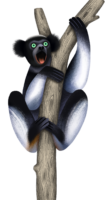Lemur Species Fact Sheets
Learn about individual lemur species in these illustrated fact sheets: where in Madagascar they live, what they eat, what threats they face, and more. Each page contains links to scientific articles for you to research the lemur species further. They are available as a web page and a one page PDF.
Aye-Aye
Aye-ayes are medium-sized, nocturnal lemurs. In fact, 80% of an Aye-aye’s night is spent traveling and foraging for food. Using a long, specialized middle finger, Aye-ayes tap the surface of branches and tree trunks to locate hollow areas where insect larvae live. The aye-aye is listed as Endangered on the IUCN Red List.
Indri
Weighing 6-9.5kg, the Indri is the largest living lemur species. They are easily identified by their loud, haunting calls used to maintain territory. These lemurs are listed as Critically Endangered on the IUCN Red List.
Black and White Ruffed Lemur
The Black and White Ruffed Lemur is one of the larger lemur species, and maintains a large home range. They are thought to be one of the only primates to build nests to birth and care for their babies. These lemurs are listed as Critically Endangered on the IUCN Red List.
Ring-tailed Lemur
Ring-tailed lemurs are the most terrestrial of all lemur species, and spend around a third of their time on the ground. They are cathemeral, meaning they are active both during the day and night. These lemurs are listed as Endangered on the IUCN Red List.
Collared Brown Lemur
These lemurs are medium sized and found only in forests in the southeast of Madagascar. They are active both during the day and the night, and spend most of their time on or close to the ground. The Collared Brown Lemur is listed as Endangered on the IUCN Red List.
Crowned Sifaka
Crowned sifakas are medium sized. They are active during the day and live most of their lives in the trees. They live in northwestern Madagascar in tropical dry lowland forest and sometimes among coastal mangroves. The Crowned Sifaka is listed as Critically Endangered on the IUCN Red List.
Diademed Sifaka
The diademed sifaka is the largest sifaka species. They are active during the day and found mostly living in the trees of the eastern Madagascar rainforest. The Diademed Sifaka is listed as Critically Endangered on the IUCN Red List.
Red-Bellied Lemur
Red-bellied lemurs are medium sized lemurs. They exhibit some sexual dichromatism. Adult females have a large cream-colored patch on their bellies and adult males have white patches under their eyes that look like teardrops. The Red-Bellied Lemur is listed as Vulnerable on the IUCN Red List.








